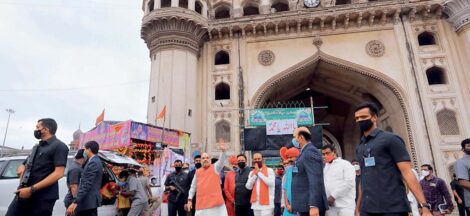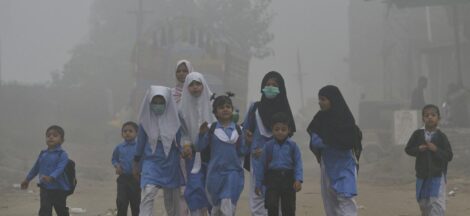By Nilanjan Banik
For India, the case of rising income inequalities deserves special attention. New World Wealth, a Johannesburg-based company, published a report where it claimed that India is the second-most unequal country in the world, with millionaires controlling 54 percent of the wealth. In Japan, the most equal country in the world, millionaires control only 22 percent of national wealth.
A reason for the rise in income inequality has to do with large dependence on the less productive agriculture sector: more than 55 percent of Indian population still earns their livelihood from agriculture. For example, in potato farming, the productivity of an Indian farmer is less than half that of the US, Germany and the Netherlands. In case of rice, it is less than half of that of the US and Egypt, and for wheat, it is less than half of that of the UK and Egypt.
Globally, India has the second largest amount of arable land (next only to the US) but less than 35 percent of this land comes under irrigation. Consequently, in a bad rainfall year, crops fail. The problem is aggravated as 83 percent of farmers in India, who are marginal and small farmers (with less than two hectare of landholding), do not have the wherewithal to understand technology or have the money power to mechanise agriculture (that will enhance productivity).
Also, if one were to consider the rate of growth in agricultural wages between 2007-08 and 2010-11, it increased by 12 percent annually, whereas over the last three years this incremental growth has fallen to 0.5 percent annually. Agricultural labourers do not have any union to protect their cause and, therefore, at a time when the Seventh Pay Commission is making government babus happy, the vast majority of agri-dependent population is becoming poorer by the day (in real terms).
The median annual wage of a farmer in India is around $290, which is barely two months’ minimum wage in Mumbai – the commercial capital of the country This has led to unequal income distribution, with the rural-urban wage gap at 45 percent in comparison to around 10 percent for China and Indonesia. Some 850 million people still live in rural India. The country has around 260 million people living in poverty and 80 percent of them live in the countryside.
Economists see the panacea lying in exploring ways to increase agri-income. Politicians typically take an easier way out — farm loan waivers — to win farmers’ support. As seen time and again, the concept “farmer first” does provide political mileage. However, the real benefit to farmers won’t come from loan waivers. Only 15 percent of marginal farmers (with less than one hectare of landholding) have access to formal credit, so a loan waiver helps them little. In fact, previous waivers have led to banks reducing credit outlay for small farmers during the next loan cycle, thereby diminishing their chances of getting formal loans.
Loan waivers actually do harm to small farmers as, with less credit outlay from the formal sector, these farmers increasingly have to depend on the informal sector. The cost difference for loan rates between the formal and informal sector varies between 30 percent and 45 percent, annually. Moreover, loan waivers mostly help richer and bigger farmers, leaving the smaller ones worse-off in the future.
Through our study, we show that the real benefit of the farmers will come through two interventions – operationalising e-mandis (online trading of agricultural output) and building more storage facilities for farm output.
Small farmers, because of the lack of adequate storage facilities, often sell their output forward to the village-level aggregators (arthiya) from whom they typically take loans for growing crops at a higher rate. It is impossible for small farmers to get a space in the state storage facilities without political patronage, also because smaller farmers do not grow enough to book an entire crate in warehouses.
Nearly 20 percent of India’s fresh produce is wasted because of storage problems. Because of lack of storage facilities small and marginal farmers seldom venture to grow high-value crops. Only 22.22 percent of marginal famers (with less than one ha of landholding size) and 23.61 percent of small farmers (between one and two ha of landholding size) grow any high-value crops. Our study finds that small and marginal farmers are likely to gain from shifting to high-value crops, after which the likelihood of a farmer being poor will be 3–7 percent lower.
The introduction of e-mandis is also likely to help small farmers. Regulated markets have problems associated with lower market size, lack of price discovery because of buyer cartelisation, and lack of information related to product standards.
On the other side, e-markets ensure a single unified licence, a mechanism for online market and better infrastructure for grade realisation. Studies have shown that after the introduction of online trading, modal prices in the e-market in Karnataka witnessed a much higher increase compared with prices of the same commodity in non e-mandis. The increase in real terms varies from 1 percent to 43 percent. In Karnataka, between 2007 and 2015, there was a 128 percent increase in the average price in e-markets, compared with an 88 percent rise in average price in non-e-markets. Coffee traded through electronic tendering fetches a 4 percent higher price over the price determined through physical auction in Karnataka. As evidence from Rajasthan suggests, because of introduction of e-market, farmers witnessed a price premium of 13 percent.
What is, however, necessary is speeding the spread of e-mandis, and other states reforming their Agricultural Produce Market Committee Act. For example, since its inception in April 2016 in Rajasthan, and until December 2017, only 2.5 percent of total produce were traded through the e-market. Other states like West Bengal do not want to reform the APMC Act because most of the ruling party (Trinamool Congress) workers are also middlemen in the government-designated mandis. The lack of reforms in the APMC Act prevents small farmers to sell directly to supermarkets, exporters, and agro-processors. Reforms and introduction of e-market will gainfully help small and marginal farmers. Additionally, other supply side interventions, such as electrification of villages, rainwater harvesting, and building roads and canals, will help mitigate losses due to crop failures. (IPA Service)
Nilanjan Banik is Professor, Bennett University.
The post India Is World’s Second Most ‘Unequal’ Country appeared first on Newspack by India Press Agency.


